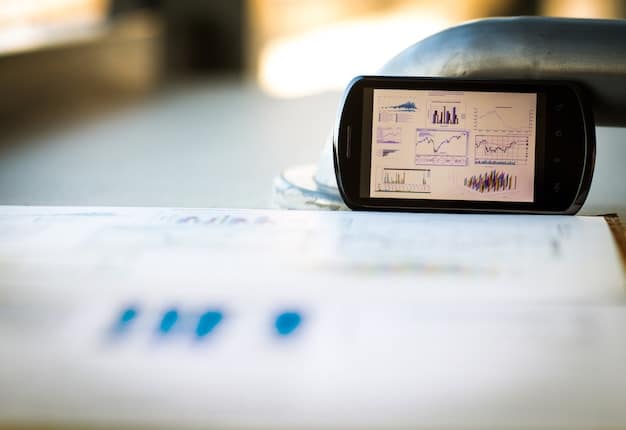AI-Powered Marketing: US Startups Driving ROI Increase

US startups are leveraging AI-powered marketing tools to achieve a significant boost in ROI, with reported increases reaching up to 20%, revolutionizing marketing strategies and creating more efficient, data-driven campaigns.
The competitive landscape of the United States is seeing a wave of innovation as startups harness the power of artificial intelligence in marketing. From personalized customer experiences to smarter advertising spends, these companies are proving that AI-powered marketing: How US Startups Are Using Artificial Intelligence to Drive a 20% Increase in ROI isn’t just a buzzword—it’s a game-changer.
The Rise of AI in US Startup Marketing
Artificial intelligence is reshaping the marketing strategies of US startups. By automating tasks, providing deeper insights, and enabling personalized customer interactions, AI is becoming an indispensable tool for achieving a higher return on investment (ROI).
AI-Driven Personalization
One of the key applications of AI in marketing is personalization. AI algorithms analyze vast amounts of data to understand customer preferences, behaviors, and needs, allowing startups to deliver tailored content, offers, and experiences.
Predictive Analytics for Marketing
AI-powered predictive analytics help startups forecast marketing trends, anticipate customer behavior, and optimize their campaigns for maximum impact. This data-driven approach leads to more efficient use of resources and improved ROI.
- Personalized Email Marketing: AI customizes email content based on individual customer profiles, increasing engagement and conversion rates.
- Dynamic Website Content: AI adjusts website content in real-time based on user behavior, providing a more relevant and personalized experience.
- Predictive Customer Segmentation: AI identifies customer segments with similar characteristics and behaviors, allowing for targeted marketing campaigns.
- Chatbot Customer Service: AI-powered chatbots provide instant, personalized customer support, improving customer satisfaction and reducing costs.
Startups that embrace AI-driven personalization and predictive analytics gain a significant competitive advantage in today’s crowded market. These technologies enable them to create more meaningful customer connections and optimize their marketing efforts for maximum efficiency.

Startup Success Stories: AI Marketing in Action
Several US startups have successfully integrated AI into their marketing strategies, achieving remarkable results. These success stories highlight the transformative potential of AI-powered marketing and provide valuable lessons for other businesses.
Case Study: Data-Driven Ad Optimization
One startup, specializing in e-commerce, used AI to optimize its advertising campaigns on social media. By analyzing data on ad performance, customer demographics, and purchase history, the AI algorithm identified high-performing ads and target audiences.
Case Study: Personalized Content Creation
Another startup, focused on content marketing, employed AI to generate personalized content for its blog and social media channels. The AI algorithm analyzed customer interests and preferences to create engaging and relevant content.
- Increased Conversion Rates: AI-driven ad optimization led to a 30% increase in conversion rates for the e-commerce startup.
- Improved Customer Engagement: Personalized content creation resulted in a 40% increase in customer engagement for the content marketing startup.
- Reduced Marketing Costs: Both startups experienced significant reductions in marketing costs due to the efficiency of AI-powered campaigns.
- Enhanced Customer Satisfaction: Personalized experiences improved customer satisfaction and loyalty.
These startup success stories demonstrate that AI-powered marketing can deliver tangible results, including increased revenue, improved customer engagement, and reduced costs. By embracing AI, startups can gain a competitive edge and achieve sustainable growth.
Key AI Tools for Marketing Startups
A variety of AI tools are available to help marketing startups improve their strategies and results. From data analysis to content creation, AI can serve the unique needs of developing companies.
AI-Powered Analytics Platforms
These platforms analyze vast amounts of data from various sources to provide insights into customer behavior, marketing campaign performance, and market trends. They can help startups identify opportunities, optimize their strategies, and measure their ROI.
AI-Driven Content Creation Tools
These tools use natural language processing (NLP) and machine learning (ML) to generate high-quality content for blogs, social media, and other marketing channels. They can help startups create engaging and relevant content that attracts and retains customers.
- Google Analytics: Provides comprehensive data on website traffic, user behavior, and conversion rates.
- HubSpot Marketing Hub: Offers a suite of AI-powered tools for marketing automation, lead generation, and customer relationship management.
- Jasper: Generates high-quality content for blogs, social media, and other marketing channels.
- MarketMuse: Helps marketers identify and create content that ranks well in search engine results pages (SERPs).
By leveraging these AI tools, marketing startups can automate tasks, gain deeper insights, and create more effective marketing campaigns. This can lead to increased efficiency, improved ROI, and sustainable growth.
Challenges and Considerations for AI Adoption
While AI offers numerous benefits for marketing startups, implementing these technologies also presents challenges that need to be addressed. Data privacy and ethical considerations are critical to consider.
Data Privacy and Security
AI algorithms rely on vast amounts of data, raising concerns about data privacy and security. Startups must ensure that they comply with data privacy regulations, such as the General Data Protection Regulation (GDPR) and the California Consumer Privacy Act (CCPA), and implement robust security measures to protect customer data.
Ethical Considerations
AI-powered marketing can be used to manipulate customers, spread misinformation, or discriminate against certain groups. Startups must be mindful of the ethical implications of their AI applications and ensure that they are used responsibly and ethically.

- Transparency: Be transparent about how AI is used to collect, process, and use customer data.
- Consent: Obtain informed consent from customers before collecting and using their data.
- Fairness: Ensure that AI algorithms are free from bias and do not discriminate against certain groups of people.
- Accountability: Establish clear lines of accountability for the use of AI in marketing.
By addressing these challenges and considerations, marketing startups can ensure that their AI adoption is responsible, ethical, and sustainable. This will help them build trust with customers and avoid potential legal and reputational risks.
Future Trends in AI-Powered Marketing
The field of AI-powered marketing is constantly evolving, with new technologies and applications emerging regularly. Staying ahead of these trends is essential for startups that want to maintain a competitive edge.
AI-Driven Voice Marketing
Voice assistants, such as Amazon Alexa and Google Assistant, are becoming increasingly popular, creating new opportunities for voice marketing. Startups can use AI to create personalized voice experiences, deliver targeted advertising messages, and provide customer support through voice channels.
AI-Enhanced Augmented Reality (AR) Marketing
AR technology is transforming the way consumers interact with brands. Startups can use AI to create AR experiences that are personalized, engaging, and informative.
- Personalized Voice Search: AI tailors search results based on individual user preferences and search history.
- Conversational Commerce: AI-powered chatbots facilitate personalized purchase experiences through voice channels.
- AR Product Visualization: AI allows customers to visualize products in their own homes before making a purchase.
- Interactive AR Ads: AI creates AR ads that are personalized, engaging, and informative.
By embracing these future trends, marketing startups can position themselves for continued success in the evolving AI landscape. This will require ongoing investment in AI research and development, as well as a willingness to experiment with new technologies and applications.
Building an AI-Ready Marketing Team
To successfully implement AI in marketing, startups need to assemble a team with the right skills and expertise. This includes data scientists, machine learning engineers, and marketing professionals with a deep understanding of AI technologies.
Hiring AI Talent
Finding and hiring qualified AI professionals can be challenging, as the demand for these skills is high. Startups may need to offer competitive salaries and benefits packages to attract top talent.
Training Existing Marketing Staff
In addition to hiring new AI talent, startups should also invest in training their existing marketing staff on AI technologies and applications. This will help them understand how AI can be used to improve their work and contribute to the company’s overall success.
- Data Science: Expertise in data analysis, statistical modeling, and machine learning.
- Machine Learning Engineering: Skills in developing and deploying AI algorithms and models.
- Marketing Automation: Knowledge of marketing automation platforms and AI-powered marketing tools.
- Content Creation: Ability to create engaging and relevant content that is optimized for AI algorithms.
By building an AI-ready marketing team, startups can ensure that they have the skills and resources needed to successfully implement and manage AI-powered marketing strategies. This will help them achieve their marketing goals and drive sustainable growth.
| Key Point | Brief Description |
|---|---|
| 🚀 AI-Driven Personalization | Tailoring customer experiences using AI to analyze data and predict preferences. |
| 📈 Predictive Analytics | Forecasting marketing trends and customer behavior with AI to optimize campaigns. |
| 🤖 AI Content Creation | Generating personalized and engaging content using AI for enhanced customer interaction. |
| 🛡️ Ethical Considerations | Addressing data privacy and ethical concerns in AI marketing to ensure responsible usage. |
FAQ
▼
AI-powered marketing uses artificial intelligence to automate and improve marketing processes, providing personalized experiences and data-driven insights. It enhances efficiency and ROI by understanding customer behaviors.
▼
AI boosts ROI by enabling more precise targeting, automating repetitive tasks, and providing predictive analytics. This leads to more effective campaigns and better allocation of marketing resources.
▼
Key tools include AI-driven analytics platforms such as Google Analytics and HubSpot Marketing Hub, and content creation tools like Jasper and MarketMuse. These tools help in data analysis and personalized content creation.
▼
Challenges include ensuring data privacy and security, addressing ethical considerations, and training existing teams on AI technologies. Transparency and responsible AI usage are crucial for startups.
▼
Future trends include AI-driven voice marketing, AI-enhanced augmented reality (AR) marketing, and personalized voice search. Embracing these trends will help startups maintain a competitive edge in the evolving landscape.
Conclusion
As US startups increasingly adopt AI-powered marketing strategies, and demonstrate significant ROI gains, staying informed and adaptable is essential for continued success and growth. By focusing on responsible data usage, ethical practices, and team training, startups can fully leverage the benefits of AI in their marketing efforts.


![Exploring Innovative Solutions with [Startup Name] Exploring Innovative Solutions with [Startup Name] - Cover Image](https://oneteknology.com/wp-content/uploads/2025/06/oneteknology.com_14_1750956884_ce64b9eb_cover-360x180.jpg)
![How [Startup Name] is Disrupting the [Industry] Market How [Startup Name] is Disrupting the [Industry] Market - Cover Image](https://oneteknology.com/wp-content/uploads/2025/06/oneteknology.com_14_1750956866_6859b264_cover-360x180.jpg)

